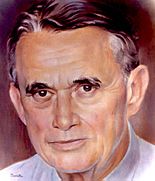Ralph McGill facts for kids
Ralph Emerson McGill (born February 5, 1898 – died February 3, 1969) was an American journalist. He wrote strong opinions in newspapers, which are called editorials. He was against racial segregation, which was the unfair separation of people based on their race. McGill was the editor of The Atlanta Constitution newspaper. He won a special award called the Pulitzer Prize in 1959 for his writing.
Early Life and School
Ralph McGill was born on February 5, 1898, in Soddy-Daisy, Tennessee. He went to school at The McCallie School in Chattanooga, Tennessee. Later, he attended Vanderbilt University in Nashville, Tennessee. However, he did not finish college. He was suspended in his last year because he wrote an article in the student newspaper that criticized the school's leaders. McGill also served in the United States Marine Corps during World War I.
Journalism Career
After the war, McGill started working for the sports section of the Nashville Banner newspaper. He quickly became the sports editor. In 1929, he moved to Atlanta, Georgia. There, he became the assistant sports editor for The Atlanta Constitution.
McGill wanted to write about more serious news, not just sports. In 1933, he got to cover the first Cuban Revolt. In 1938, he received a special scholarship called a Rosenwald Fellowship. This allowed him to report on the Nazi takeover of Austria.
His articles helped him become the executive editor of the Constitution. He used this position to show how harmful segregation was. Many angry readers sent him threats and letters. Some people even burned crosses on his lawn, shot bullets into his windows, and left small bombs in his mailbox.
Writing for Everyone
In the late 1950s, McGill became a syndicated columnist. This meant his articles were printed in newspapers all across the country, reaching many readers. In 1960, students started using passive resistance tactics, like the Greensboro sit-ins, to protest segregation. McGill was the only editor of a big white Southern newspaper to cover these events at first. Other newspapers soon followed his lead.
He became friends with Presidents John F. Kennedy and Lyndon B. Johnson. He advised them on civil rights issues. He also helped as a secret messenger to several African nations.
Later Years and Legacy
Besides the Pulitzer Prize, McGill received many other honors. He got the Elijah Parish Lovejoy Award. Many universities, including Harvard, gave him honorary degrees. In 1964, he received the Presidential Medal of Freedom, which is a very high award in the United States.
In 1963, he published his book The South and the Southerner. He also published collections of his newspaper articles. Ralph McGill died from a heart attack just two days before his 71st birthday.
After his death, a street in Atlanta was named Ralph McGill Boulevard. A middle school in Atlanta was also named after him. Each year, The Grady School of Journalism at the University of Georgia holds The McGill Lecture. A famous journalist speaks at this event to honor him. In 1970, McGill was added to the Georgia Newspaper Hall of Fame.
His personal writings are kept at Emory University Library. Martin Luther King Jr. mentioned Ralph McGill in his famous Letter from Birmingham Jail. King called him one of the "few enlightened white persons" who understood the civil rights movement.
McGill's fight against segregation is shown in an opera called A Scholar Under Siege. A National Public Broadcasting TV special in 1988, Dawn's Early Light: Ralph McGill and the Segregated South, also showed his impact. Famous people like Julian Bond, Jimmy Carter, and John Lewis appeared in the special.


